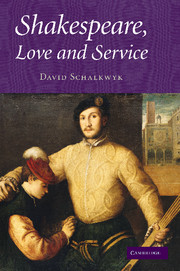Book contents
- Frontmatter
- Contents
- Acknowledgments
- Introduction
- 1 “Thou serv'st me, and I'll love thee”: Love and Service in Shakespeare's World
- 2 Performance and Imagination: The Taming of the Shrew and A Midsummer Night's Dream
- 3 “His man, unbound”: The Comedy of Errors and The Tempest
- 4 “More than a steward”: The Sonnets, Twelfth Night, and Timon of Athens
- 5 “Office and devotion”: Henry IV Parts 1 and 2, the Sonnets, and Antony and Cleopatra
- 6 “I am your own forever”: King Lear and Othello
- 7 “Something more than man”: The Winter's Tale
- Bibliography
- Index
7 - “Something more than man”: The Winter's Tale
Published online by Cambridge University Press: 22 September 2009
- Frontmatter
- Contents
- Acknowledgments
- Introduction
- 1 “Thou serv'st me, and I'll love thee”: Love and Service in Shakespeare's World
- 2 Performance and Imagination: The Taming of the Shrew and A Midsummer Night's Dream
- 3 “His man, unbound”: The Comedy of Errors and The Tempest
- 4 “More than a steward”: The Sonnets, Twelfth Night, and Timon of Athens
- 5 “Office and devotion”: Henry IV Parts 1 and 2, the Sonnets, and Antony and Cleopatra
- 6 “I am your own forever”: King Lear and Othello
- 7 “Something more than man”: The Winter's Tale
- Bibliography
- Index
Summary
The Winter's Tale is densely populated by servants. They carry messages, offer comfort, retreat into despair, act loyally and disloyally; they even engage in the poetry of praise. The brunt of Shakespeare's fascination with the inwardness of service and its material restraints and opportunities is carried by Leontes' noble attendant, Camillo; the sacrificial Antigonus; and, in a different, pastoral key, the mercurial Autolycus. Yet nowhere is Shakespeare's distinctive conception of service as apparent as in Paulina, wife of a councillor, companion to the queen, and, finally, critical (in every respect) servant and advisor to Leontes himself. She is obviously the chief agent of resistance, healing, and restoration in the play's transformation from erotic deathliness to pastoral life. It is perhaps less apparent that the combination of these three forms of ethical action constitute the epitome of service in the Shakespearean canon. The royal brothers, given to tyranny in their own distinctive ways, are taught the virtues of service where they least expect it: in the hands and tongues of women, who were always meant, they believe, to serve and obey them.
Shakespeare's late romance represents to an even greater degree than King Lear the crisis of service in the face of tyranny. The play shows that service in its fullest sense is impossible under tyrannical masters, except insofar as servants are prepared to oppose magisterial intransigence. Disobedience, critical opposition, and judicious counsel are thus shown to be of the essence of service.
- Type
- Chapter
- Information
- Shakespeare, Love and Service , pp. 263 - 298Publisher: Cambridge University PressPrint publication year: 2008

